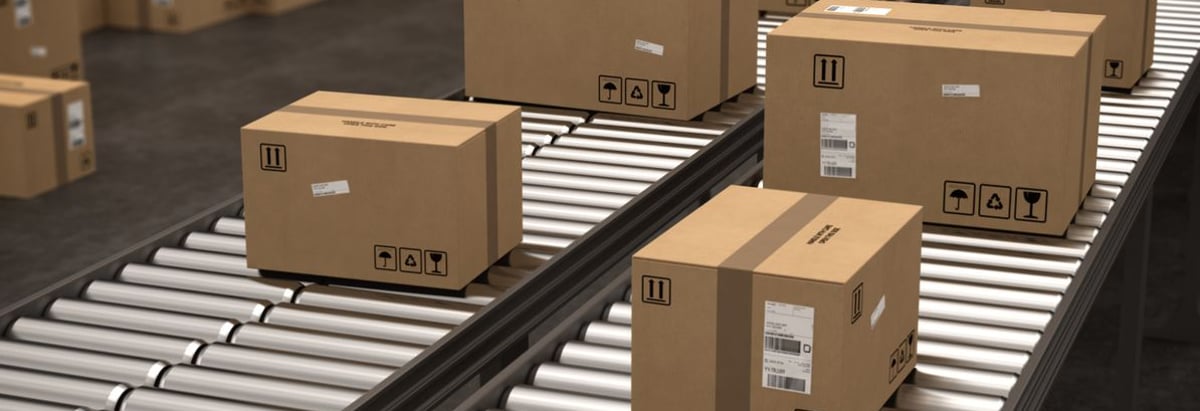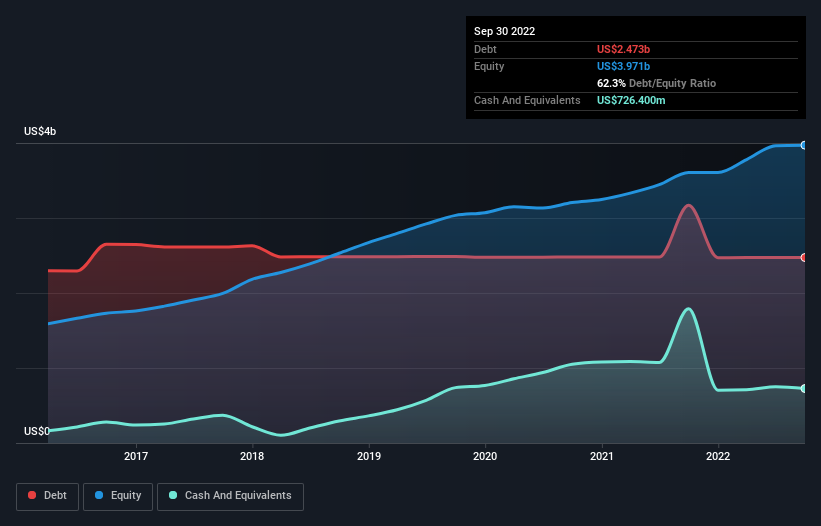- United States
- /
- Packaging
- /
- NYSE:PKG
We Think Packaging Corporation of America (NYSE:PKG) Can Stay On Top Of Its Debt

Some say volatility, rather than debt, is the best way to think about risk as an investor, but Warren Buffett famously said that 'Volatility is far from synonymous with risk.' So it seems the smart money knows that debt - which is usually involved in bankruptcies - is a very important factor, when you assess how risky a company is. Importantly, Packaging Corporation of America (NYSE:PKG) does carry debt. But should shareholders be worried about its use of debt?
What Risk Does Debt Bring?
Debt assists a business until the business has trouble paying it off, either with new capital or with free cash flow. Ultimately, if the company can't fulfill its legal obligations to repay debt, shareholders could walk away with nothing. While that is not too common, we often do see indebted companies permanently diluting shareholders because lenders force them to raise capital at a distressed price. By replacing dilution, though, debt can be an extremely good tool for businesses that need capital to invest in growth at high rates of return. The first step when considering a company's debt levels is to consider its cash and debt together.
See our latest analysis for Packaging Corporation of America
What Is Packaging Corporation of America's Net Debt?
You can click the graphic below for the historical numbers, but it shows that Packaging Corporation of America had US$2.47b of debt in September 2022, down from US$3.17b, one year before. However, it does have US$726.4m in cash offsetting this, leading to net debt of about US$1.75b.

A Look At Packaging Corporation of America's Liabilities
Zooming in on the latest balance sheet data, we can see that Packaging Corporation of America had liabilities of US$963.4m due within 12 months and liabilities of US$3.41b due beyond that. Offsetting this, it had US$726.4m in cash and US$1.12b in receivables that were due within 12 months. So it has liabilities totalling US$2.53b more than its cash and near-term receivables, combined.
While this might seem like a lot, it is not so bad since Packaging Corporation of America has a huge market capitalization of US$11.9b, and so it could probably strengthen its balance sheet by raising capital if it needed to. But it's clear that we should definitely closely examine whether it can manage its debt without dilution.
We measure a company's debt load relative to its earnings power by looking at its net debt divided by its earnings before interest, tax, depreciation, and amortization (EBITDA) and by calculating how easily its earnings before interest and tax (EBIT) cover its interest expense (interest cover). Thus we consider debt relative to earnings both with and without depreciation and amortization expenses.
Packaging Corporation of America's net debt is only 0.87 times its EBITDA. And its EBIT covers its interest expense a whopping 20.4 times over. So you could argue it is no more threatened by its debt than an elephant is by a mouse. On top of that, Packaging Corporation of America grew its EBIT by 37% over the last twelve months, and that growth will make it easier to handle its debt. The balance sheet is clearly the area to focus on when you are analysing debt. But it is future earnings, more than anything, that will determine Packaging Corporation of America's ability to maintain a healthy balance sheet going forward. So if you want to see what the professionals think, you might find this free report on analyst profit forecasts to be interesting.
Finally, a company can only pay off debt with cold hard cash, not accounting profits. So it's worth checking how much of that EBIT is backed by free cash flow. Looking at the most recent three years, Packaging Corporation of America recorded free cash flow of 50% of its EBIT, which is weaker than we'd expect. That's not great, when it comes to paying down debt.
Our View
The good news is that Packaging Corporation of America's demonstrated ability to cover its interest expense with its EBIT delights us like a fluffy puppy does a toddler. And the good news does not stop there, as its EBIT growth rate also supports that impression! Looking at the bigger picture, we think Packaging Corporation of America's use of debt seems quite reasonable and we're not concerned about it. After all, sensible leverage can boost returns on equity. The balance sheet is clearly the area to focus on when you are analysing debt. But ultimately, every company can contain risks that exist outside of the balance sheet. We've identified 2 warning signs with Packaging Corporation of America (at least 1 which doesn't sit too well with us) , and understanding them should be part of your investment process.
When all is said and done, sometimes its easier to focus on companies that don't even need debt. Readers can access a list of growth stocks with zero net debt 100% free, right now.
New: Manage All Your Stock Portfolios in One Place
We've created the ultimate portfolio companion for stock investors, and it's free.
• Connect an unlimited number of Portfolios and see your total in one currency
• Be alerted to new Warning Signs or Risks via email or mobile
• Track the Fair Value of your stocks
Have feedback on this article? Concerned about the content? Get in touch with us directly. Alternatively, email editorial-team (at) simplywallst.com.
This article by Simply Wall St is general in nature. We provide commentary based on historical data and analyst forecasts only using an unbiased methodology and our articles are not intended to be financial advice. It does not constitute a recommendation to buy or sell any stock, and does not take account of your objectives, or your financial situation. We aim to bring you long-term focused analysis driven by fundamental data. Note that our analysis may not factor in the latest price-sensitive company announcements or qualitative material. Simply Wall St has no position in any stocks mentioned.
About NYSE:PKG
Packaging Corporation of America
Manufactures and sells containerboard and corrugated packaging products in the United States.
Excellent balance sheet established dividend payer.


